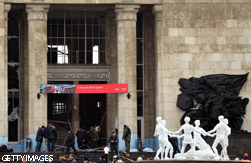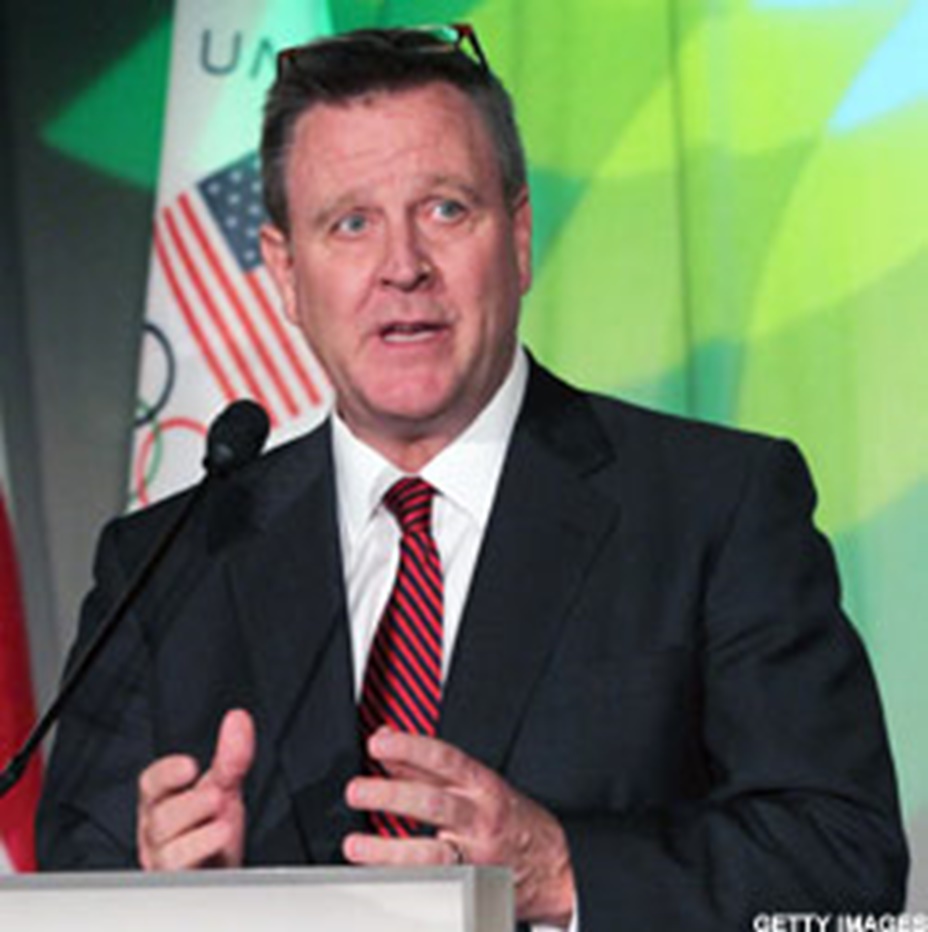USOC CEO Scott Blackmun said the organization is "concerned" following twin bombings last week in the Russian city of Volgograd, which is near Sochi, and takes security "very seriously." Blackmun, appearing Tuesday on NBC’s "Today," said, "Each Games presents a different kind of challenge for us, but the events of the last 48 hours have definitely gotten our attention." He added, “I think this is the first time that we’ve had an incident so close to the Games both in terms of geography and in terms of time. But, as I said, the reality is that there are different challenges at every Games." NBC's Matt Lauer asked, "In terms of finding a balance here, when you say that the Russians are committed to safety, do you think they’ll be able to find the proper balance between staging an athletic competition and creating an armed encampment?” Blackmun responded, "Balance is exactly the right word. It’s funny, a few weeks ago we were talking about the fact that it was going to be difficult to get in and out of the park, and I suspect that people will be a lot more tolerant of that today than they were two or three weeks ago" ("Today," NBC, 12/31).
SUSPICIOUS OF SOCHI: U.S. snowboarder Seth Wescott said that he "doesn't think he will attend the opening ceremony if he qualifies" due to security concerns. Wescott on Monday said, "It definitely concerns me. I don't want to be pessimistic about it. ... You're watching events start to happen. It's a country that's had massive amounts of internal strife that has manifested itself into actual combat. We're not far away from where a lot of that has gone on in their country" (USA TODAY, 12/31). U.S. speedskater Jilleanne Rookard said, "I am concerned. I'm scared their security may be involved. I don't know if I necessarily trust their security forces. But they don't want a national embarrassment, either." But the AP's Eddie Pells reported a "number of Olympic leaders and federations signaled their confidence in the host country." IOC Marketing Commission Chair Gerhard Heiberg: "When we come to Sochi, it will be impossible for the terrorists to do anything. The village will be sealed off from the outside world. Security has been our priority No. 1 ever since Sochi got the games" (AP, 12/30). Capitals LW Alex Ovechkin said, "I don't think it’s going to happen in Olympics because there’s going to be lots of security out there. I’m sure Russian government is going to do everything that’s possible to protect the people and athletes there" (WASHINGTONPOST.com, 12/30).
AN OMINOUS INSURGENCY: The CP noted Russian officials "vow the athletes will be safe, even though they will be competing in a city just 500 kilometres away from the roots of an Islamist insurgency" (CP, 12/31). CBS' Elizabeth Palmer said, "The modern Olympics have never been staged so close to an area with an active insurgency and a history of terrorist attacks" ("CBS Evening News," CBS, 12/30). IHS County Risk Russian defense and security expert Matthew Clements said, "The chances of a successful attack at one of the Olympic venues are slim, but attacks in the region around it still have the desired psychological effect" (WSJ.com, 12/31). USA TODAY's Johnson & Michaels in a front-page piece wrote the bombings underscore a "persistent concern that terrorists may seek to disrupt the global sporting event by striking outside the host city's hardened security perimeter." A Russian security source two months ago said that there was "fear that so many resources had been dispatched to lock down Sochi that other potential targets throughout the country, including transportation hubs ... could be vulnerable." Russia's security plan for the Olympics "has created a fortified boundary around the venues, from Sochi's Black Sea coast to the Caucasus mountain range." The source said that the plan has "siphoned assets from other parts of Russia, leaving some areas potentially vulnerable" (USA TODAY, 12/31). Russian Olympic Committee President Aleksandr Zhukov said that all necessary security measures "had been taken to protect athletes and visitors in Sochi." Zhukov: "No additional security measures will be taken in Sochi in light of the terrorist attack. Everything necessary has been done." However, in N.Y., Steven Myers in a front-page piece noted Zhukov's remarks "did not address the threat outside of Sochi." With security "already heavily tightened there, experts have warned that those who want to disrupt the Olympics might turn to 'softer' targets elsewhere" (N.Y. TIMES, 12/31).
 |
Volgograd train station was the location of a
terrorist attack this week |
WATERTIGHT SECURITY: In DC, Englund & Lally noted security at the Olympics "is watertight, so Islamic extremists have vowed to bring violence to the Russian heartland." The chance that terrorist activity "will spoil the Olympics has been a prime worry for security officials" (WASHINGTON POST, 12/31). ABC News’ Brian Ross reported many U.S. officials "do not share" the confidence of Russian officials regarding the Games being safe, and "some say the Russians have failed to fully cooperate with American security teams assigned to protect the 235 U.S. athletes who will come here to Sochi." He added, "The U.S. will be sending small teams of armed security people to Sochi to protect American athletes" ("ABC World News," ABC, 12/30). Ross: "Officials told me, when I was in Sochi earlier this month, that they plan to shut down all traffic but for official cars and ring the city with troops and security officials in their pledge to make it airtight from terrorists" ("GMA," ABC, 12/31). Security expert Chuck Hecker: "Basically, you won’t be able to move in Sochi without somebody knowing that you're moving and knowing where you're going" ("NBC Nightly News," NBC, 12/30). 3 WIRE SPORTS' Alan Abrahamson writes, "What the Volgograd attacks have done already is add another layer of complexity to what may be ... the most complicated project in the history of the modern Olympic movement." Security at the Games is "going to be highly visible and, probably, heavy-handed." The feeling of being there "is probably going to be akin to being in an armed camp" (3WIRESPORTS.com, 1/2).
TIME FOR DRASTIC MEASURES? In Chicago, Philip Hersh writes one idea to keep the Games safe is to "stage them -- and the Paralympics -- over the regularly scheduled time period in manageable pieces at some of the cities or countries that have been previous Winter Olympic hosts, many of which have World Cup competitions every year." He writes instead of his plan being a capitulation to terrorists, it is "an 11th-hour return to sanity after the misguided" IOC decision in '07 to indulge Russia President Vladimir Putin’s "folly." Hersh suggests men's hockey could be held "in Canada, with medal games in Vancouver," as NHL arenas "will be available." He also suggests women's hockey to be held "in Lake Placid." Hersh: "Is this a joke? No less so than the idea to give the 2014 Winter Olympics to Sochi in the first place" (CHICAGO TRIBUNE, 1/2).
PROGNOSTICATING THE PERILS: In N.Y., Filip Bondy wrote he doubts "anything terrible will happen at the Olympic venues," as terrorism, "by its cowardly nature, strikes when least expected and at the softest possible targets." Sochi "will be anything but soft" (N.Y. DAILY NEWS, 12/31). In L.A., Michael Hiltzik wrote under the header, "Are The Sochi Olympics Heading For Disaster?" The Olympics "will open some five weeks from now in a frighteningly unstable part of the former Soviet empire," and the Volgograd bombings "add another layer of tension and doubt about Russian security preparations." There are "more reasons for concern for the success of these Olympics," as they are "being staged in the worst conceivable location, stupendously over budget, rife with corruption and logistically nightmarish" (L.A. TIMES, 12/31). A CHICAGO TRIBUNE editorial is stated under the header, "Putin's Olympic Moment," and the subheader, "Not Glorious But Embarrassing." Putin "may have thought hosting the Olympics would boost his stature in Russia and elsewhere," but the "actual effect ... has been to focus more attention on his thin skin, contempt for Western values and unquenchable need for control." In the coming weeks and months, he "will find foreign news media examining how he steered Russia off the democratic path it took after the collapse of communism" (CHICAGO TRIBUNE, 1/2).





